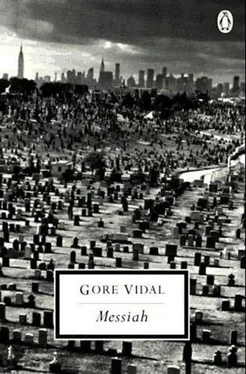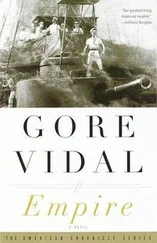Gore Vidal - Messiah
Здесь есть возможность читать онлайн «Gore Vidal - Messiah» весь текст электронной книги совершенно бесплатно (целиком полную версию без сокращений). В некоторых случаях можно слушать аудио, скачать через торрент в формате fb2 и присутствует краткое содержание. Жанр: Современная проза, на английском языке. Описание произведения, (предисловие) а так же отзывы посетителей доступны на портале библиотеки ЛибКат.
- Название:Messiah
- Автор:
- Жанр:
- Год:неизвестен
- ISBN:нет данных
- Рейтинг книги:3 / 5. Голосов: 1
-
Избранное:Добавить в избранное
- Отзывы:
-
Ваша оценка:
- 60
- 1
- 2
- 3
- 4
- 5
Messiah: краткое содержание, описание и аннотация
Предлагаем к чтению аннотацию, описание, краткое содержание или предисловие (зависит от того, что написал сам автор книги «Messiah»). Если вы не нашли необходимую информацию о книге — напишите в комментариях, мы постараемся отыскать её.
Messiah — читать онлайн бесплатно полную книгу (весь текст) целиком
Ниже представлен текст книги, разбитый по страницам. Система сохранения места последней прочитанной страницы, позволяет с удобством читать онлайн бесплатно книгу «Messiah», без необходимости каждый раз заново искать на чём Вы остановились. Поставьте закладку, и сможете в любой момент перейти на страницу, на которой закончили чтение.
Интервал:
Закладка:
More to the point, however, was the attitude of our intellectuals who constituted at this time a small, militantly undistinguished minority, directly descended in spirit if not in fact from that rhetorical eighteenth-century Swiss whose romantic and mystical love for humanity was magically achieved through a somewhat obsessive preoccupation with himself. His passion for self-analysis flourished in our mid-century, at least among the articulate few who were capable of analysis and who, in time, like their great ancestor, chose the ear of the world for their confessional.
Men of letters lugubriously described their own deviations (usually political or sexual, seldom aesthetic), -while 'painters worked devotedly at depicting unique inner worlds which were not accessible to others except in a state of purest empathy hardly to be achieved without a little fakery in a selfish world. It was, finally, the accepted criterion that art's single function was the fullest expression of a private vision… which was true enough though the visions of men lacking genius are not without a certain gloom. Genius, in this time, was quite as rare as in any other and, to its credit, it was not a self-admiring age… critics found merit only in criticism, a singular approach which was to amuse the serious for several decades. Led by artists, the intellectuals voiced their guilt at innumerable cocktail parties where it was accepted as an article of faith that each had a burden of guilt which could, once recognized, be exorcised; the means of recognition were expensive but rewarding: a trained and sympathetic listener would give the malaise a name and reveal its genesis; then, through confession (and occasionally "reliving") the guilt would vanish along with asthma, impotence and eczema. The process, of course, was not easy. To facilitate therapy, it became the custom among the cleverer people to set aside all the traditional artifices of society so that both friends and strangers could confess to one another their worst deeds, their most squalid fantasies in a series of competitive monologues conducted with arduous sincerity and surprisingly successful on every level but that of communication.
I am sure that this sort of catharsis was not entirely valueless: many of the self-obsessed undoubtedly experienced relief when dispensing secrets… it was certainly an instructive shock for them to find that even their most repellent aberrations were accepted quite perfunctorily by strangers too intent on their own problems to be outraged, or even very interested. This discovery was not always cheering. There is a certain dignity and excitement in possessing a dangerous secret life. To lose it in maturity is hard… and once promiscuously shared, it does become ordinary, no more troublesome than obvious dentures.
Many cherished private hells were forever lost in those garrulous years and the vacuum each left was invariably filled with a boredom which, in its turn, could only be dispelled by faith. As a result, the pursuit of the absolute, in one guise or another, became the main preoccupation of these romanticists who professed with some pride a mistrust of the reason, derived quite legitimately from their own stunning incapacity to assimilate the social changes created by machinery, their particular Lucifer. They rejected the idea of the reflective mind, arguing that since both logic and science had failed to establish the first cause of the universe or (more important) humanity's significance, only the emotions could reveal to us the nature of reality, the key to meaning. That it was actually no real concern of this race why or when or how the universe came into being was an attitude never, so far as I can recall, expressed by the serious-minded of the day. Their searching, however, was not simply the result of curiosity; it was more than that: it was an emotional, senseless plunging into the void, into the unknowable and the irrelevant. It became, finally, the burden of life, the blight among the flowers: the mystery which must be revealed, even at the expense of life. It was a terrible crisis, made doubly hard since the eschewal of logic left only one path clear to the heart of the dilemma: the way of the mystic, and even to the least sensible it was sadly apparent that, lacking a superior and dedicated organization, one man's revelation is not apt to be of much use to another.
Quantities of venerable attitudes were abandoned and much of the preceding century's "eternal truths and verities" which had cast, rock-like, so formidable and dense a shadow, were found, upon examination, to be so much sand, suitable for the construction of fantastic edifices but not durable, nor safe from the sea's tide.
But the issue was joined: dubious art was fashioned, authorities were invoked, dreams given countenance and systems constructed on the evidence of private illumination.
For a time, political and social action seemed to offer a way out, or in. Foreign civil wars, foreign social experiments were served with a ferocity difficult to comprehend; but later, when the wars and experiments went wrong, revealing, after such high hopes, the perennial human inability to order society, a disillusion resulted, bitterly resolved in numerous cases by the assumption of some mystical dogma, preferably one so quaintly rich with history, so sweeping and unreasonable in its claims as to be thoroughly acceptable to the saddened romanticist who wanted, above all else, to feel, to know without reasoning. So in these portentous times, only the scientists were content as they constructed ever more fabulous machines with which to split the invisible kernels of life while the anti-scientifics leaped nervously from one absolute to another… now rushing to the old for grace, now to the new for salvation, no two of them really agreeing on anything except the need for agreement, for the last knowledge… and that, finally, was the prevailing note of the age; since reason had been declared insufficient, only a mystic could provide the answer, only he could mark the boundaries of life with a final authority, inscrutably revealed. It was so perfectly clear. All that was lacking was the man.
One
1
The garden was at its best that first week in the month of June. The peonies were more opulent than usual and I walked slowly through the green light on the terrace above the white river, enjoying the heavy odor of peonies and of new roses rambling in hedges.
The Hudson was calm, no ripple revealed that slow tide which even here, miles to the north of the sea, rises brackishly at the moon's disposition. Across the river the Catskills, water-blue, emerged sharply from the summer's green as though the earth in one vivid thrust had attempted sky, fusing the two elements into yet another, richer blue… but the sky was only framed, not really touched, and the blue of hills was darker than the pale sky with its protean clouds all shaped by wind, like the stuff of auguries and human dreaming.
The sky that day was like an idiot's mind, wild with odd clouds, but lovely too, guileless, natural, allusive.
I did not want to go in to lunch, although there was no choice in the matter. I had arrived at one o'clock; I was expected at one-thirty. Meanwhile, avoiding the house until the last possible moment, I had taken a neighbor's privilege of strolling alone about the garden; the house behind me was gray and austere, granitic, more English than Hudson Valley. The grounds swept softly down toward the river nearly a mile away. A vista had been cleared from the central terrace, a little like the one at Versailles but more rustic, less royal. Dark green trees covered the hills to left and right of the sweep of lawn and meadow. No other house could be seen. Even the railroad between the terrace and the water was invisible, hidden by a bluff… only its sound and an occasional blur of smoke upon the blue marked that machine's essential passage.
Читать дальшеИнтервал:
Закладка:
Похожие книги на «Messiah»
Представляем Вашему вниманию похожие книги на «Messiah» списком для выбора. Мы отобрали схожую по названию и смыслу литературу в надежде предоставить читателям больше вариантов отыскать новые, интересные, ещё непрочитанные произведения.
Обсуждение, отзывы о книге «Messiah» и просто собственные мнения читателей. Оставьте ваши комментарии, напишите, что Вы думаете о произведении, его смысле или главных героях. Укажите что конкретно понравилось, а что нет, и почему Вы так считаете.












